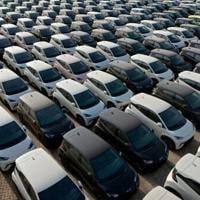The European Commission has announced plans to impose an extra nine-percent tariff on Tesla’s electric cars made in China, which is lower compared to the tariffs faced by Chinese firms unless Beijing makes concessions in the ongoing trade dispute.
After an anti-subsidy probe found that Chinese electric vehicles were unfairly undermining European competitors, Brussels had previously imposed hefty provisional tariffs on EVs imported from China, on top of the existing 10 percent duties.
Beijing has strongly opposed the EU tariffs and has appealed to the World Trade Organization. The European Commission has acknowledged the appeal while expressing confidence that its actions are compliant with WTO regulations.
The commission released a draft plan on Tuesday to make the tariffs definitive, with slightly revised rates. Interested parties have until the end of August to provide input, and EU member states are expected to approve the plan by the end of October.
The revised rates for major Chinese manufacturers would be 17 percent for market leader BYD (down from 17.4), 19.3 percent for Geely (down from 19.9), and 36.3 percent for SAIC (down from 37.6).
Other Chinese producers that cooperated with Brussels will face a tariff of 21.3 percent (slightly higher than the previous 20.8), while those that did not cooperate will be subject to the maximum 36.3 percent duty.
Tesla, owned by Elon Musk, requested a separate duty rate from Brussels, which was set at nine percent. The commission determined that Tesla received lower Chinese subsidies compared to domestic manufacturers, with benefits related to batteries, land use, and export grants.
European manufacturers involved in joint ventures in China, such as Volkswagen and BMW, will receive the tariff rate applicable to their Chinese partner firms.
The Chinese Chamber of Commerce to the EU criticized the commission’s approach as protectionist and unfair, warning that it could escalate trade tensions. However, the commission remains open to resolving the dispute without resorting to tariffs, placing the onus on China to propose alternatives.
The EU has stated that it does not have legal grounds to collect the provisional duties paid by companies since July 5, which will be released once the definitive measures take effect.
The trade dispute between China and the EU is part of broader tensions involving trade, technology, and national security. Both sides have initiated probes into various trade practices, with a delicate balance to be maintained to protect the European auto industry while fostering green growth and avoiding a confrontation with Beijing.
China’s dominance in the electric vehicle market is attributed to its targeted industrial strategy and significant state funding for domestic firms and R&D. This has given Chinese companies an advantage over European automakers in providing more affordable and efficient EVs.
Chinese EV exports abroad rose by 70 percent in 2023, totaling $34.1 billion, with nearly 40 percent going to the EU. China’s emergence as an EV powerhouse poses challenges for the European auto industry, requiring strategic responses to maintain competitiveness.
ec/gv





